The demand for mobile apps has increased like never before. That is why a lot of apps are launched each day. However, only a few manage to stand out in the market.
An outstanding app idea can take your business to success. Transforming this vision into a thriving reality demands expertise, insight, and an understanding of the market. However, if you lack a technical background, accessing these essentials might become a challenge. This is precisely where the guidance of app development consultants proves valuable.
To materialize your web app development concept into a refined product, seeking help from qualified professionals becomes imperative. An app development consultant provides expertise and guidance to individuals or businesses looking to develop, improve, or optimize mobile applications. Their role can vary depending on the specific needs of the client but typically includes assisting the business to grow with their expertise.
Still not convinced about the merits of an app development consultant? Let’s look at what makes them a must-have for the growth of a business.
App Development Consultant Vs App Development Company
In the digital world, the role of app development consultants and app development companies has become indispensable. While they may appear to be similar, a closer look reveals small differences that can have a big impact on the performance.
So, let us understand the difference between an app development consultant and an app development company in the table below. This will help you better understand, their roles, responsibilities, and deliverables.
Their different working methodologies and roles have an impact on performance and productivity. So, from experiences and technology preferences to communication styles and work strategies, you need to evaluate them previously to make the right call. By understanding these individuals, they gain clarity to make decisions that align with their passions and growth aspirations.
Now, let’s understand the differences with the help of the below-given table:
| Category | App Development Consultant | App Development Company |
| Definition | External expert offering app development process expertise. | Team of professionals specializing in app development. |
| Duties | Analyze company needs, propose solutions, advise on projects, and influence investment decisions. | Develop apps, plan, design, and execute projects. |
| Requirements | 3-5 years experience, bachelor’s degree, proficiency in various programming languages. | Varies by role, and often includes computer science degrees, experience, and programming skills. |
| Nature of Employment | External contractor/freelancer, diverse projects. | Internal roles within the company. |
| Direct Communications | Project managers (strategic & tactical). | Internal teams across departments. |
| Work Compensation | Project or hourly based fluctuates with demand. | Hourly or salary-based, tied to organizational goals. |
Key Considerations for Hiring an App Development Consultant
Understanding the goals and objectives of your business is very important. When developing an app, the first step is to understand your requirements to know the areas where you need the guidance of a consultant. For example, if your goal is to grow your digital presence across the platforms go for a hybrid or cross-platform app development company.
For more data-driven applications, powerful technologies such as Ionic, Xamarin, Java, or .NET may be more suitable. By aligning your technology with the goals and objectives of your application, you ensure seamless development.
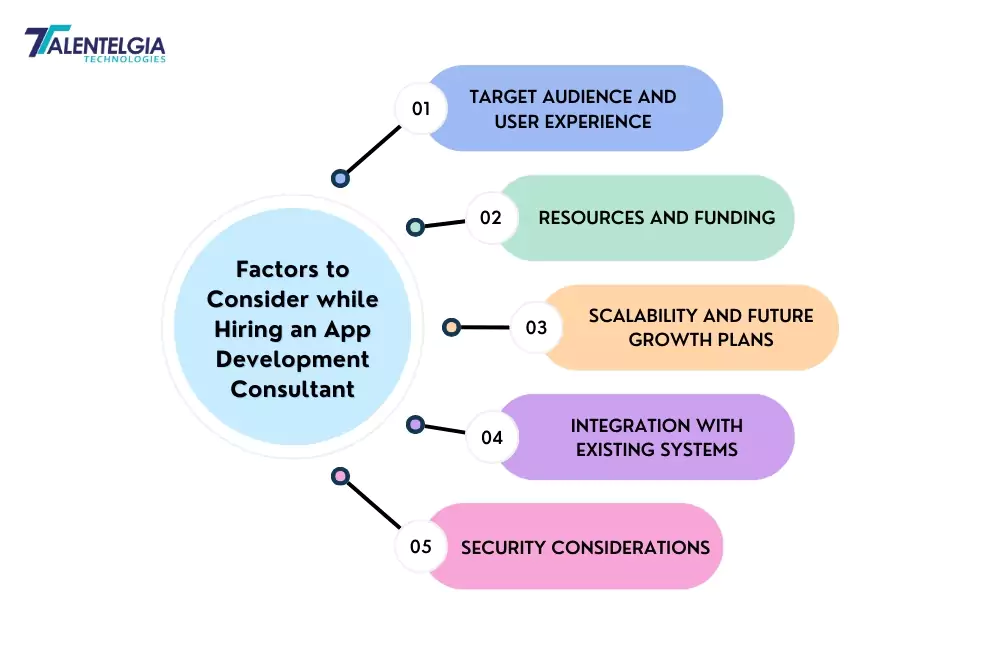
If you are wondering about what technologies to choose, don’t forget to check the table given below.
Target Audience and User Experience
The technology you choose directly affects how users interact with your app. Factors such as the user’s skills and preferred tools should be taken into account when choosing a technology that impacts user experience. If your target audience consists mostly of mobile users, it is recommended that you prioritize mobile devices. Also, consider the level of customization required to provide the best user experience.
Resources and Funding
Different technologies have different features and functionalities. While some may require more investment or expertise, others offer affordable and convenient services. It’s important to evaluate your financial constraints and the resources available to your team, including hardware and development capabilities. Choose the options that will provide your company with the best return on investment.
Scalability and Future Growth Plans
It is important to expect future growth when choosing a technology stack for application development. Make sure the stack you choose supports scalability and can accommodate future expansion plans. Choose a technology stack that can meet growing needs, especially if you expect a large user base or plan to introduce new features.
Integration with Existing Systems
Compatibility with existing systems is important when you are considering integrating your application with existing systems. Consider your application integration needs and choose a group that will help integrate with your existing system. This ensures efficient data exchange when working with developers and interoperability with other systems.
Security Considerations
Security is important when choosing a technology stack for your application. High-tech systems with appropriate security measures to protect sensitive data and user privacy. Increase application security and reliability by choosing a suite with strong protection by meets your application’s specific security needs.
Identifying these factors leads to informed decision-making, which leads to improved efforts and user experience.
Also Read: How to Choose the Right Tech Stack for SAAS
Tech Stacks & Technologies Used By App Development Consultants
| Field | Technology | Description | Use Case |
| Native Development | C++ with Unreal Engine | Creates high-performance games with rich graphics. | Mobile games with complex 3D environments. |
| Native Development | C# with Xamarin | Enables code reuse for developers with a .NET background to build iOS and Android apps. | Finance or social media apps require a native feel for each platform. |
| Cross-platform | Xamarin | Allows writing code once in C# and deploying it on both iOS and Android. | Business productivity apps that need to function seamlessly across platforms. |
| Cross-platform | Ionic | Uses web technologies (HTML, CSS, and JavaScript) to build hybrid apps with a native-like experience. | News apps where fast development and consistency across platforms are crucial. |
| Cross-platform | NativeScript | Develops high-performance cross-platform apps using JavaScript and TypeScript. | Social networking apps that require a balance of performance and a native feel. |
| Web-based | Progressive Web Applications (PWAs) | Delivers an app-like experience accessible through a browser. | To-do list apps that don’t require complex functionality but benefit from offline access. |
Technologies To Look At When Selecting An App Development Consultant
By using the latest and most powerful tech stack developers can make high-performing apps that are at par with the user’s needs. Each technology stack has unique benefits and considerations that allow developers to tailor their approach to meet the unique needs and demands of their development efforts. The right choice for you will depend on your specific requirements. Read below to know what tech stack can you consider for mobile app development.
Native Development
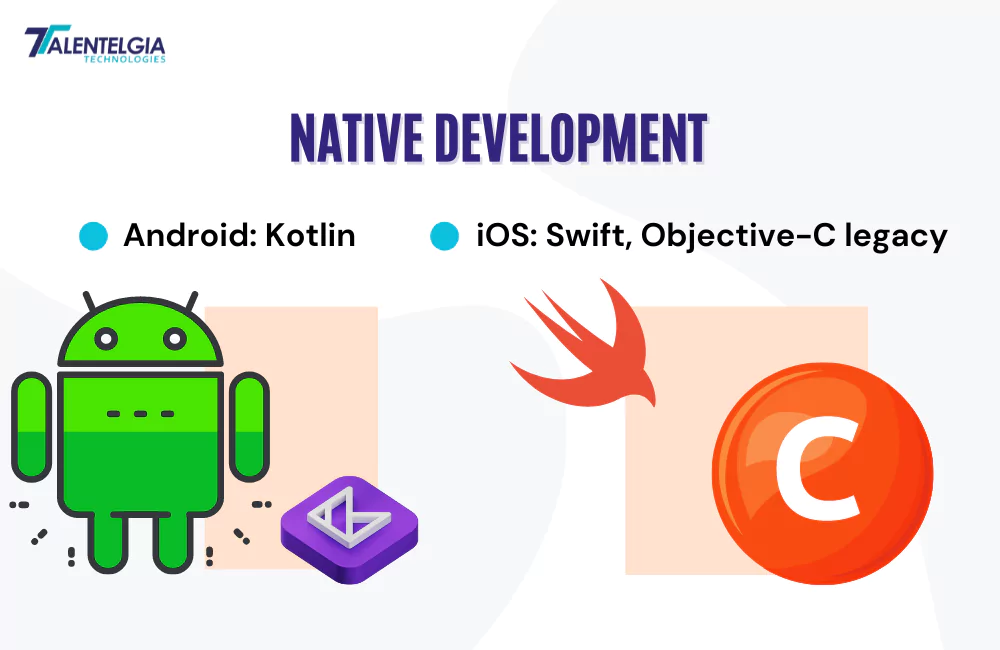
In native development, Kotlin is used as it offers modern features and makes things productive. While Swift dominates iOS and is known for its simplicity and seamless integration with the Apple ecosystem, Objective-C is reserved for legacy support.
- Android: Kotlin
- iOS: Swift, Objective-C (legacy)
Cross-platform Development
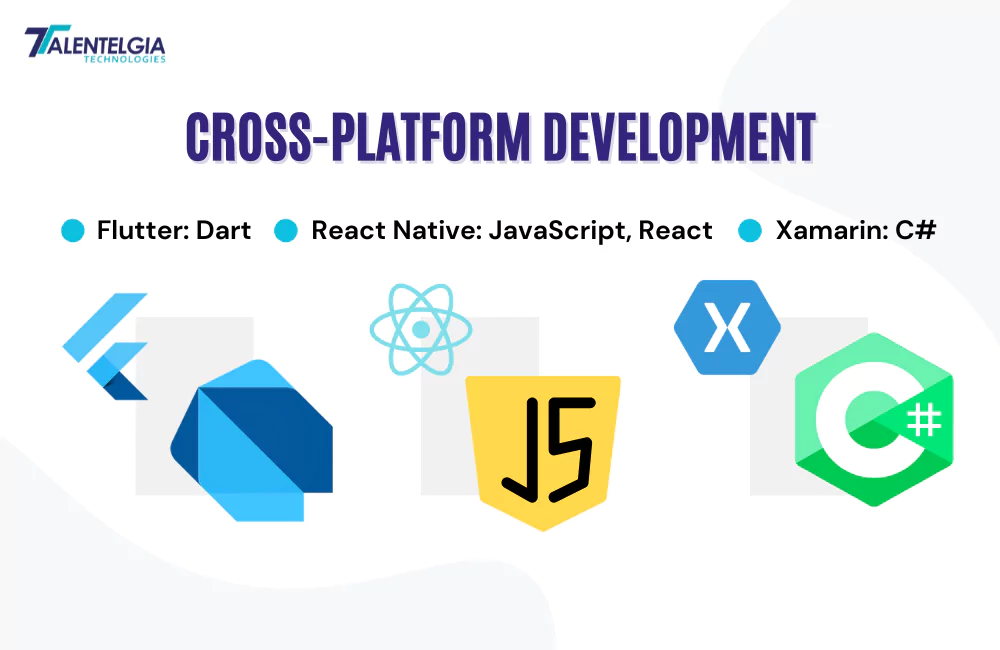
Cross-platform development allows code to be shared more than once on the platform. Flutter uses Dart to create beautiful and fast applications. React Native leverages JavaScript to provide a developer-friendly approach. Xamarin uses C# to share code between iOS and Android.
- Flutter: Dart
- React Native: JavaScript,
- Xamarin: C#
Web Application Development
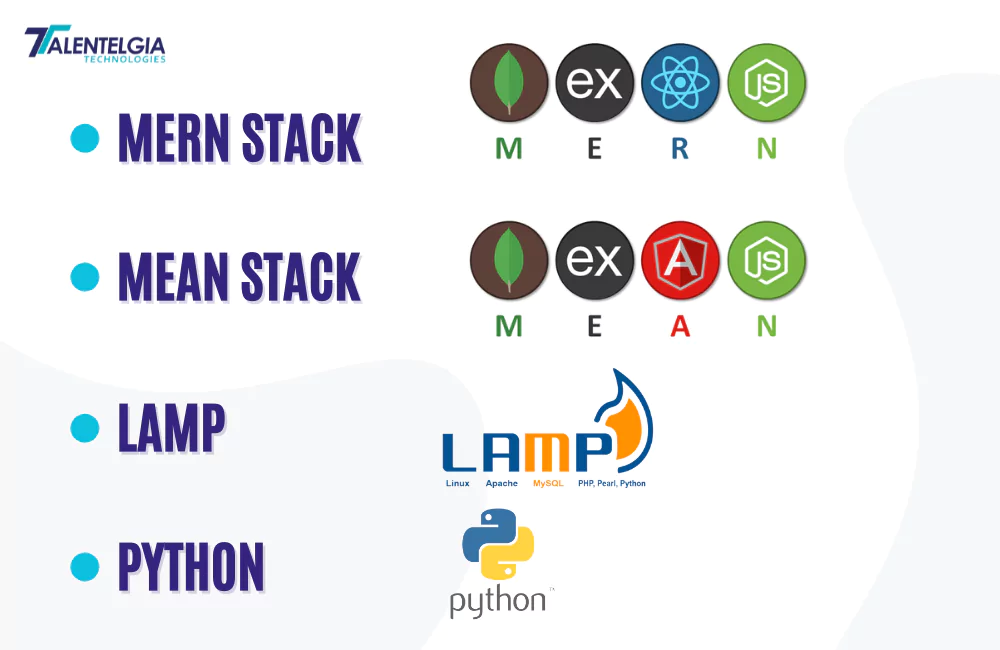
Full stack development makes the work easier for consultants. There are many full stacks you can choose from. Choose MERN Stack development services (MongoDB, Express.js, React.js, Node.js) for JavaScript-based solutions. MEAN Stack (MongoDB, Express.js, Angular, Node.js) provides a way to use Angular for clients. LAMP Stack (Linux, Apache, MySQL, PHP) is also versatile and can meet many web needs.
- MERN Stack: MongoDB, Express.js, React.js, Node.js
- MEAN Stack: MongoDB, Express.js, Angular, Node.js
- LAMP Stack: Linux, Apache, MySQL, PHP
Django differs from the Python framework with its fast and clean development. It simplifies website development with focus, functionality, and resource templates.
Django: Python
Project Management Tools
For successful collaboration, App development consultants need to know various project management tools designers, professional SEO engineers, and content writers. Some of the essential project management tools are:
| Software | Focus | Key Strengths | Examples |
| Jira | Agile software development | Integrated development tools, flexible workflows | Bug tracking, scrum boards |
| Asana | General work management | User-friendly, team communication | Task creation, progress tracking |
| Trello | Kanban-based visual work management | Visual organization, easy task management | Kanban boards, task lists & cards |
| Monday.com | Customizable work management | Project customization, an all-in-one platform | Gantt charts, time tracking |
| Wrike | Project planning & work management | Comprehensive planning, complex projects | Large application development |
What is the Cost of Hiring an App Development Consultant?
More and more businesses are now going for online apps. However, turning business ideas into reality through application development requires experience and high-quality developers. When you work with an app development consultant, they help you make the right choice for designers and engineers. So before we get into the details, let’s talk about what you need and how you can reduce your hiring costs.
Understanding the factors is important for effective planning, resource allocation, and budget management in application development. By carefully analyzing each element, companies can make informed decisions about the effectiveness of the project and investment.
Building an app from scratch involves many steps, including design choices, language considerations, and coding. However, hiring an app development consultant can be costly.
So it’s natural to consider factors like how much it costs to hire an app developer. The price depends on many factors; One of the most important is the developer’s position. Location may affect hourly wages due to differences in living standards and wages. For example, app developers in North America (especially the US and Canada) tend to pay higher prices than we choose outsourcing services to development hubs like India.
Starting your application development journey requires a good understanding of the factors that influence development costs. The cost of development depends on different factors. These include everything from the complexity of the project scope to the expertise of the development team plays an important role in determining the total cost. Let’s look at these factors to understand the process of hiring an App development consultant.
1. Project Scope
The project scope defines its features and functions that directly affect the cost. A comprehensive system with different types of users, cross-platform compatibility, and advanced integration will cost more than a more complex system with less functionality.
2. Project Complexity
Complexity refers to the challenges associated with development. Jobs that require high-tech equipment or complex solutions require specialized skills, leading to higher costs. For example, creating a blockchain-powered mobile application is more difficult than creating a simple e-commerce website.
Cost by Complexity of App (Estimated Hourly Rates)
| Complexity of App | Estimated Hourly Rate Range |
| Simple App (e.g. weight tracker) | $25 – $75 |
| Medium Complexity App (e.g., social media app) | $75 – $125 |
| High Complexity App (e.g., fintech app with complex security) | $125+ |
3. Knowledge and Skills of the Development Team
The skills of the development team affect cost and quality. An experienced team can be more efficient but deliver better solutions with fewer errors. Conversely, smaller teams may offer lower costs but require more time or produce lower results.
4. Use Open-Source Tools or Third-Party Tools
Using open-source tools and third-party tools can reduce development costs by using existing resources. Integrating pre-built solutions rather than custom development helps improve costs while maintaining quality.
5. Working Time
Working time affects the cost, short time requires additional capital and additional cost. Rushed projects will need to hire more workers to meet the deadline, leading to higher costs.
6. Quality Requirements
Quality requirements can affect costs. Projects that require quality assessment and follow high standards will cost more. For example, applications that target large audiences or important functions must be rigorously tested and validated.
7. Size and Location of the Development Team
The size and location of the development team affect production costs and time. Larger companies can provide faster delivery but also have higher operating costs. Remote or overseas teams can provide cost savings due to lower costs of living but can present communication challenges.
The average hourly wage of an application developer in North America ranges from $50 to $50. $150. Hiring an app developer in Canada typically costs around 40 Canadian dollars per hour, including a wide range of services from managed solutions to freelancing.
Cost by Consultant Location (Estimated Hourly Rates)
| Region | Estimated Hourly Rate Range |
| North America, Western Europe, Australia | $75 – $175+ |
| India | $15 to $100 |
| Eastern Europe | $50 – $125 |
| Southeast Asia (excluding major cities) | $30 – $80 |
| South America | $40 – $100 |
Pros of Hiring an App Development Consultant
Businesses often face an important decision about whether to use internal resources or seek outside expertise. Hiring an app development consultant is a wise decision. They are professionals who offer support, and expertise throughout the development process. Let us look at the benefits of choosing an application development consultant. From expert guidance to access to quality and expert skills, hiring an app development consultant can be a strategic move for businesses looking for the challenge of building an app with confidence and success.
1. Cost Efficiency
App development consultants are a great option for businesses looking to maximize revenue. Companies can reduce management costs by choosing outsourcing. Unlike managing an in-house team, where the cost includes salaries, benefits, training, and purchasing, consulting allows businesses to pay solely for action, whether on an hourly basis or with a fixed payment model. The use of such funds can have a positive impact on profits by ensuring financial stability and growth.
2. Access to Resources and Expertise
Consultants who specialize in mobile app development have access to resources and expertise. They have licenses and software to provide the best service to their customers. They can also help you hire professionals with experience in coding, design, business development, and other industries. Their team of experts manages all aspects of the project, from measurement to post-delivery support. This ensures the success of your application development by providing efficient and effective project management.
3. 24/7 Support
Outsourcing to a mobile app development company has the advantage of 24-hour support. Customers can count on quick assistance and solutions for any issues that arise during the installation process. With support representatives always available, issues can be resolved quickly, disruption can be minimized and operational efficiency can be achieved. This ongoing support encourages collaboration and cooperation between the customer and the development organization, increasing overall satisfaction and project results.
4. Time-Saving
Working with app development consultants allows businesses to cut down development time and use resources efficiently. So, you can focus on other important aspects of the business that need attention. This simplifies operations and increases productivity as internal resources are allocated to areas where they can make the biggest impact. Moreover, these consultants specialize in app development, ensuring that they complete the project well within the agreed time frame. It provides an advantage to businesses by saving time and ensuring on-time delivery.
Pros & Cons of Hiring App Development Consultants
| Pros | Cons |
| Cost Efficiency | Data Privacy Impact |
| Access to Resources and Expertise | Lack of Control Over the Development Process |
| 24/7 Support | Expensive for Small Changes |
Disadvantages of Hiring an App Development Consultant
Although there are many benefits to hiring an app development consultant, it also presents some challenges and decisions that businesses must weigh carefully. This explains the disadvantages of hiring external consultants for application development projects, highlighting issues such as relying on external experts, problem communication, and management of the development process. By understanding these drawbacks, businesses can make informed decisions and implement risk mitigation strategies to ensure the improvement process is more effective and successful.
1. Data Privacy Impact
Outsourcing application development poses risks to data privacy and security. Unlike internal developers who are part of the company and have a right to protect sensitive information, external development teams can create security vulnerabilities that open up the chance of deleting the file. Government agencies and organizations that manage confidential or sensitive information often opt for in-house development to better manage information security. Although signing a confidentiality agreement can reduce some risks, the possibility of data leakage remains a significant concern when outsourcing application development.
2. Lack of Control over the Development Process
Outsourcing limits the client from directly controlling and monitoring the development request process. Unlike in-house development, where stakeholders can monitor progress and provide immediate feedback, outsourcing often involves external efforts to improve the company’s performance. While hiring a project manager can help bridge this gap, it may result in less management compared to in-house development. Lack of direct supervision can lead to poor communication, delays, or deviations from the client’s needs, affecting the overall quality and success of the project.
3. Expensive for Small Changes
Small changes to an application can be costly and cumbersome when managed by an external development organization. Unlike families who can make small changes without any disruption or significant financial commitment, small changes may require additional support, time, and money. This is especially difficult for businesses with limited capital or limited time; may inhibit their ability to adapt and redesign applications as needs or strategies change.
4. Communication Issues
Creating apps for companies in different locations can cause communication issues and language issues. Collaboration across distances and borders can result in slow, difficult-to-understand, or ineffective communication and collaboration. Additionally, language differences between customers and development teams can make communication more difficult, affecting the clarity and effectiveness of interactions. While technological advances have made remote collaboration easier, overcoming the communication gap in application development remains a regular challenge.
FAQs
Frequently Asked Questions (FAQ):
1. Should I hire an app development consultant or an app development company?
Both app development consultant and app development company have their pros and cons. An app development company can provide personalized services based on your unique needs. Consultants provide strategic insight, effective project management, and effective solutions. However, the right choice will depend on your unique needs and niche.
2.How can an app development consultant help my team?
App consultants From expert guidance to access to quality and expert skills, hiring an app development consultant can be a strategic move for businesses looking for the challenge of building an app with confidence and success.
3. How does the deadline affect the hiring costs of application development consultants?
A tight deadline may require consultants to allocate additional resources or additional work hours, which may increase costs.
4. What are the key benefits of hiring an app development consultant?
Hiring an application development consultant has many advantages such as budget, access to experts, 24/7 support, and saving time. Consultants improve the development process, provide good guidance, and ensure effective project management, ultimately ensuring the success of the implementation job.
Conclusion
The decision to hire an application development consultant is a strategic decision for businesses. Whether you are creating a new project or optimizing an existing offering, consultants provide the skills, strategic guidance, and project management necessary to ensure success in your efforts. By understanding the key differences between an app development consultant and development companies, assessing the appropriate fit, and determining the benefits and costs of hiring the advice of professionals, businesses can make informed decisions that align with their goals. With the app development consultant by your side, you can turn your app vision into reality and success, driving growth and innovation in the competitive app market.


 Healthcare App Development Services
Healthcare App Development Services
 Real Estate Web Development Services
Real Estate Web Development Services
 E-Commerce App Development Services
E-Commerce App Development Services E-Commerce Web Development Services
E-Commerce Web Development Services Blockchain E-commerce Development Company
Blockchain E-commerce Development Company
 Fintech App Development Services
Fintech App Development Services Fintech Web Development
Fintech Web Development Blockchain Fintech Development Company
Blockchain Fintech Development Company
 E-Learning App Development Services
E-Learning App Development Services
 Restaurant App Development Company
Restaurant App Development Company
 Mobile Game Development Company
Mobile Game Development Company
 Travel App Development Company
Travel App Development Company
 Automotive Web Design
Automotive Web Design
 AI Traffic Management System
AI Traffic Management System
 AI Inventory Management Software
AI Inventory Management Software
 AI Software Development
AI Software Development  AI Development Company
AI Development Company  AI App Development Services
AI App Development Services  ChatGPT integration services
ChatGPT integration services  AI Integration Services
AI Integration Services  Generative AI Development Services
Generative AI Development Services  Natural Language Processing Company
Natural Language Processing Company Machine Learning Development
Machine Learning Development  Machine learning consulting services
Machine learning consulting services  Blockchain Development
Blockchain Development  Blockchain Software Development
Blockchain Software Development  Smart Contract Development Company
Smart Contract Development Company  NFT Marketplace Development Services
NFT Marketplace Development Services  Asset Tokenization Company
Asset Tokenization Company DeFi Wallet Development Company
DeFi Wallet Development Company Mobile App Development
Mobile App Development  IOS App Development
IOS App Development  Android App Development
Android App Development  Cross-Platform App Development
Cross-Platform App Development  Augmented Reality (AR) App Development
Augmented Reality (AR) App Development  Virtual Reality (VR) App Development
Virtual Reality (VR) App Development  Web App Development
Web App Development  SaaS App Development
SaaS App Development Flutter
Flutter  React Native
React Native  Swift (IOS)
Swift (IOS)  Kotlin (Android)
Kotlin (Android)  Mean Stack Development
Mean Stack Development  AngularJS Development
AngularJS Development  MongoDB Development
MongoDB Development  Nodejs Development
Nodejs Development  Database Development
Database Development Ruby on Rails Development
Ruby on Rails Development Expressjs Development
Expressjs Development  Full Stack Development
Full Stack Development  Web Development Services
Web Development Services  Laravel Development
Laravel Development  LAMP Development
LAMP Development  Custom PHP Development
Custom PHP Development  .Net Development
.Net Development  User Experience Design Services
User Experience Design Services  User Interface Design Services
User Interface Design Services  Automated Testing
Automated Testing  Manual Testing
Manual Testing  Digital Marketing Services
Digital Marketing Services 
 Ride-Sharing And Taxi Services
Ride-Sharing And Taxi Services Food Delivery Services
Food Delivery Services Grocery Delivery Services
Grocery Delivery Services Transportation And Logistics
Transportation And Logistics Car Wash App
Car Wash App Home Services App
Home Services App ERP Development Services
ERP Development Services CMS Development Services
CMS Development Services LMS Development
LMS Development CRM Development
CRM Development DevOps Development Services
DevOps Development Services AI Business Solutions
AI Business Solutions AI Cloud Solutions
AI Cloud Solutions AI Chatbot Development
AI Chatbot Development API Development
API Development Blockchain Product Development
Blockchain Product Development Cryptocurrency Wallet Development
Cryptocurrency Wallet Development About Talentelgia
About Talentelgia  Our Team
Our Team  Our Culture
Our Culture 
 Healthcare App Development Services
Healthcare App Development Services Real Estate Web Development Services
Real Estate Web Development Services E-Commerce App Development Services
E-Commerce App Development Services E-Commerce Web Development Services
E-Commerce Web Development Services Blockchain E-commerce
Development Company
Blockchain E-commerce
Development Company Fintech App Development Services
Fintech App Development Services Finance Web Development
Finance Web Development Blockchain Fintech
Development Company
Blockchain Fintech
Development Company E-Learning App Development Services
E-Learning App Development Services Restaurant App Development Company
Restaurant App Development Company Mobile Game Development Company
Mobile Game Development Company Travel App Development Company
Travel App Development Company Automotive Web Design
Automotive Web Design AI Traffic Management System
AI Traffic Management System AI Inventory Management Software
AI Inventory Management Software AI Software Development
AI Software Development AI Development Company
AI Development Company ChatGPT integration services
ChatGPT integration services AI Integration Services
AI Integration Services Machine Learning Development
Machine Learning Development Machine learning consulting services
Machine learning consulting services Blockchain Development
Blockchain Development Blockchain Software Development
Blockchain Software Development Smart contract development company
Smart contract development company NFT marketplace development services
NFT marketplace development services IOS App Development
IOS App Development Android App Development
Android App Development Cross-Platform App Development
Cross-Platform App Development Augmented Reality (AR) App
Development
Augmented Reality (AR) App
Development Virtual Reality (VR) App Development
Virtual Reality (VR) App Development Web App Development
Web App Development Flutter
Flutter React
Native
React
Native Swift
(IOS)
Swift
(IOS) Kotlin (Android)
Kotlin (Android) MEAN Stack Development
MEAN Stack Development AngularJS Development
AngularJS Development MongoDB Development
MongoDB Development Nodejs Development
Nodejs Development Database development services
Database development services Ruby on Rails Development services
Ruby on Rails Development services Expressjs Development
Expressjs Development Full Stack Development
Full Stack Development Web Development Services
Web Development Services Laravel Development
Laravel Development LAMP
Development
LAMP
Development Custom PHP Development
Custom PHP Development User Experience Design Services
User Experience Design Services User Interface Design Services
User Interface Design Services Automated Testing
Automated Testing Manual
Testing
Manual
Testing About Talentelgia
About Talentelgia Our Team
Our Team Our Culture
Our Culture
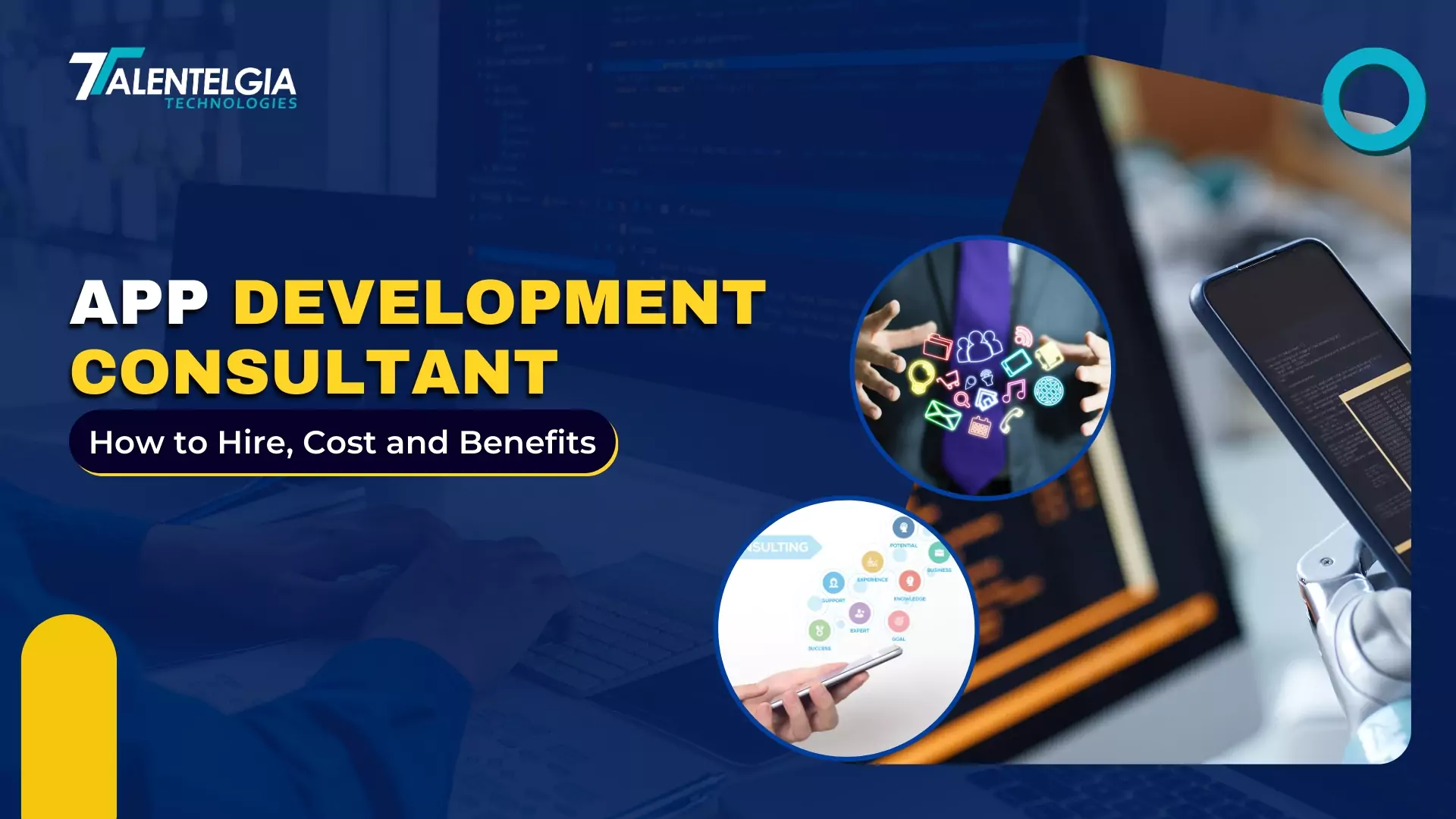

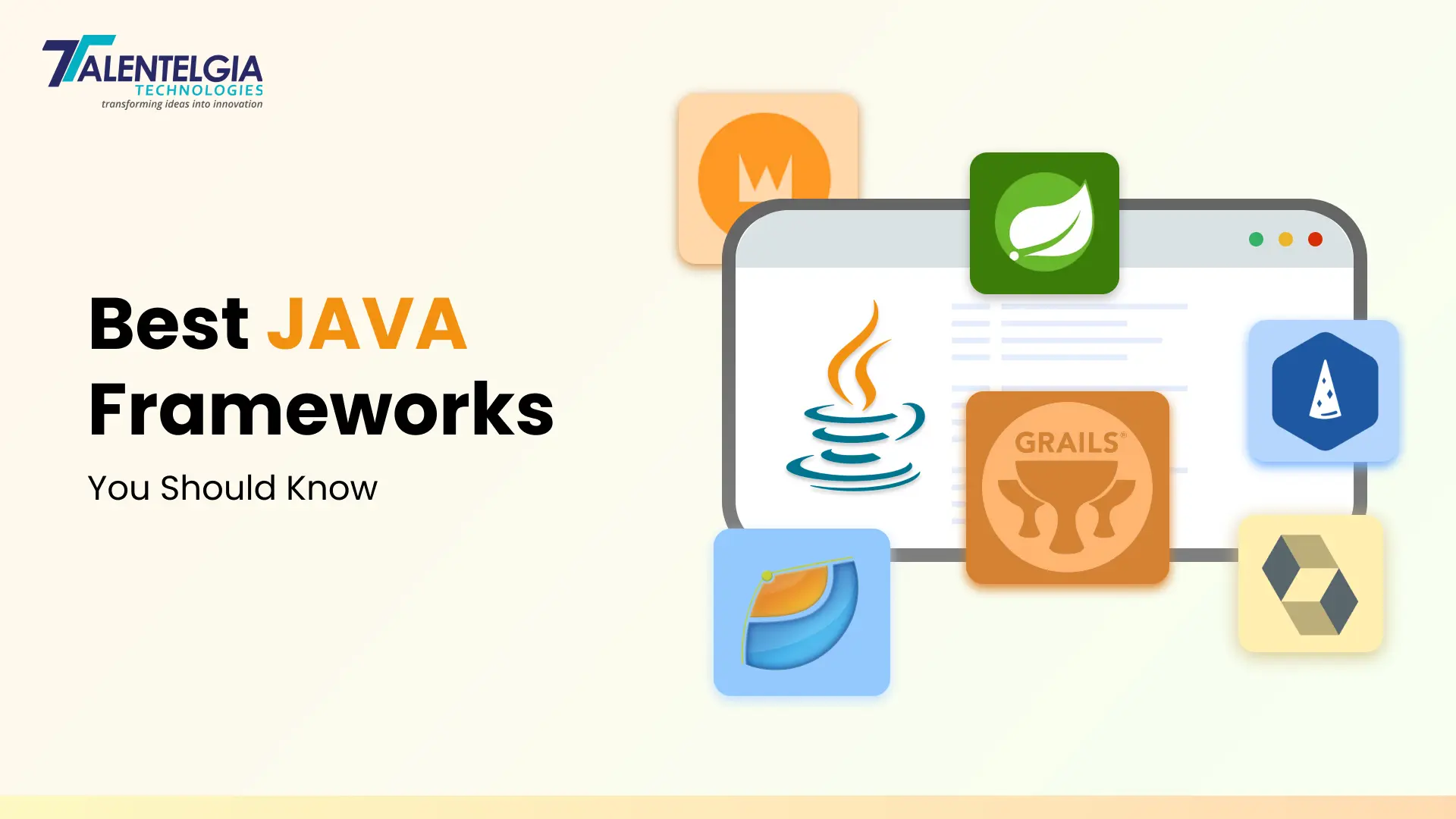

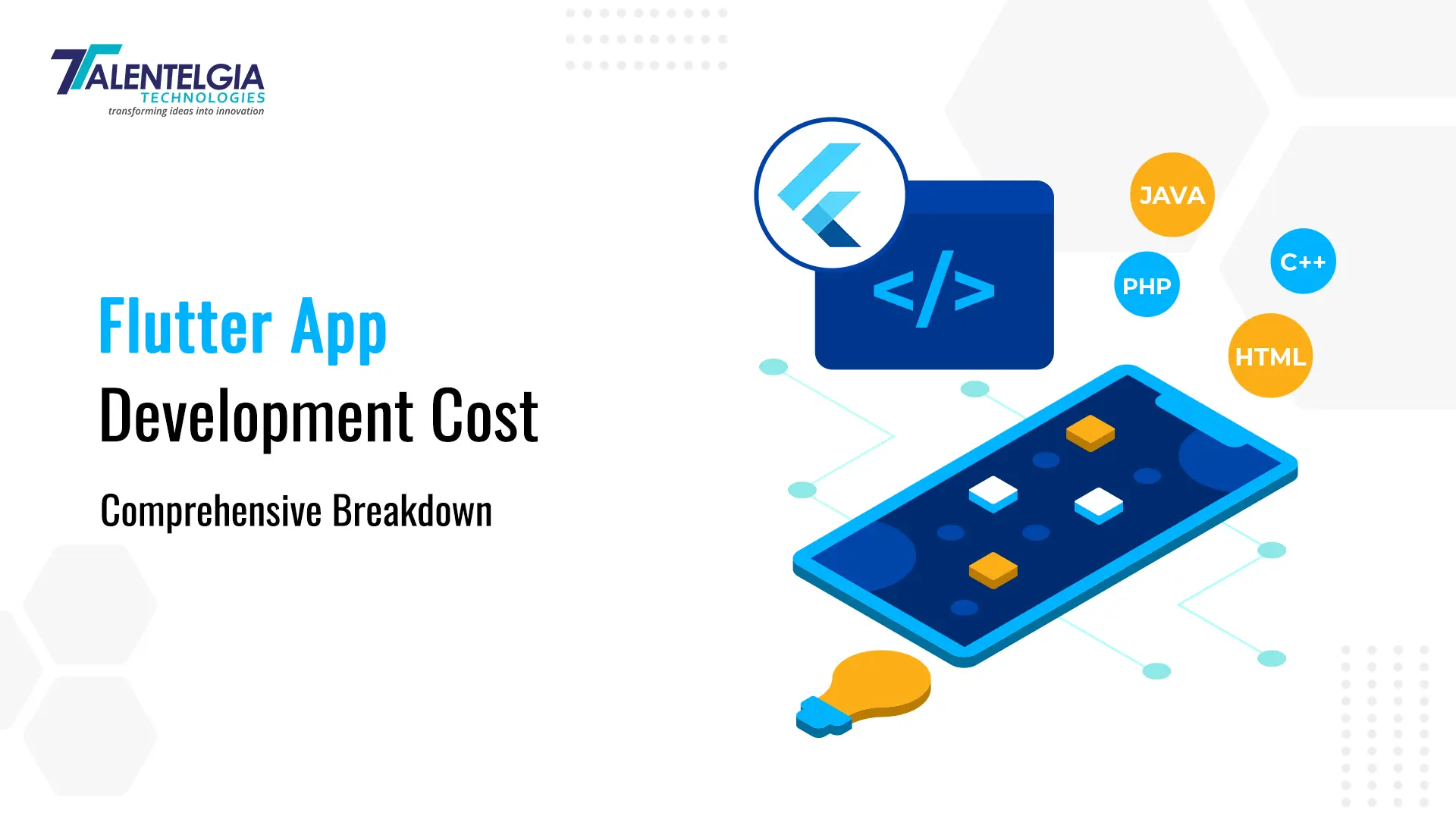
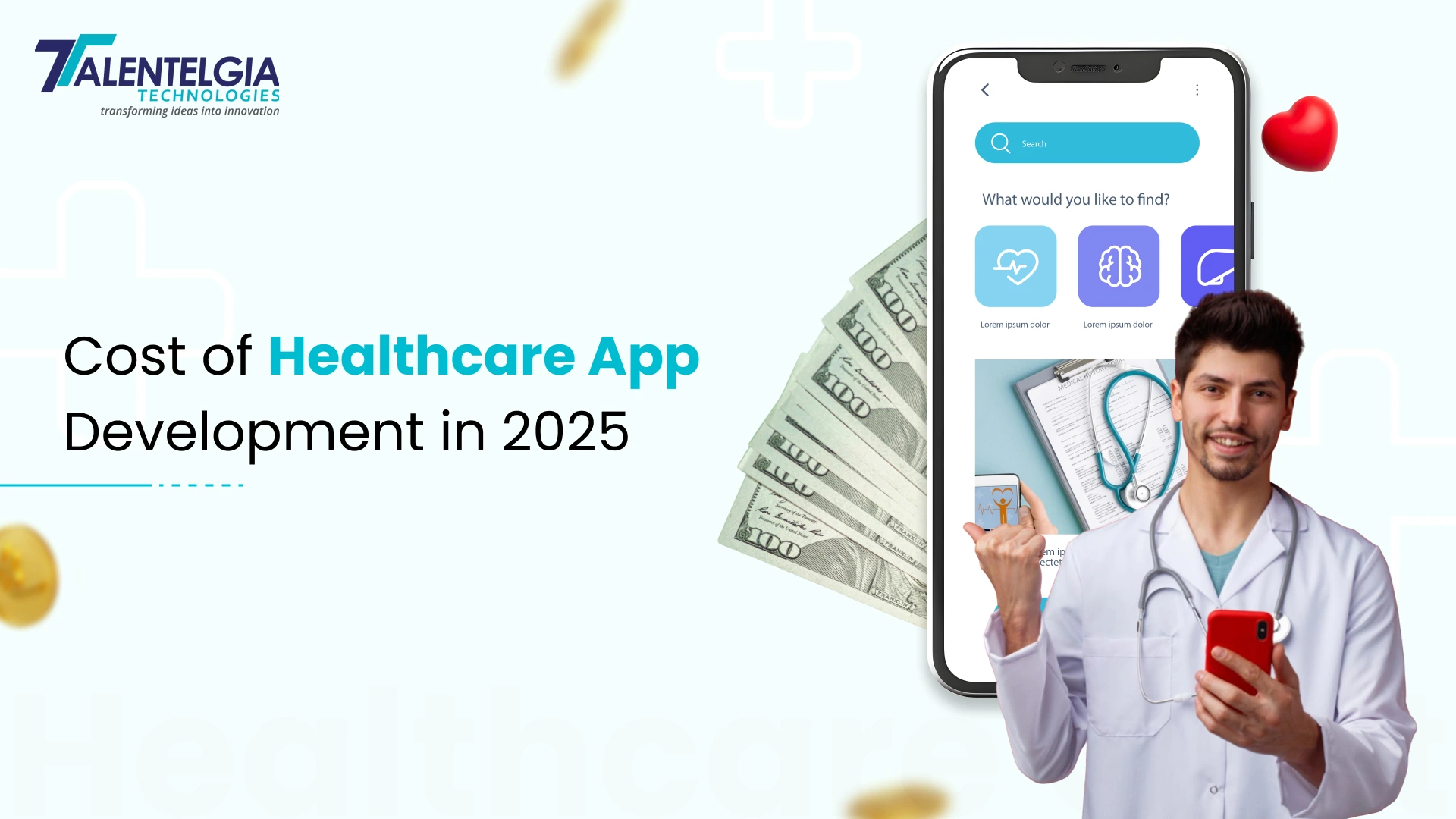











 Write us on:
Write us on:  Business queries:
Business queries:  HR:
HR: 




